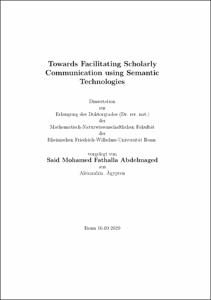Towards Facilitating Scholarly Communication using Semantic Technologies

Towards Facilitating Scholarly Communication using Semantic Technologies

| dc.contributor.advisor | Auer, Sören | |
| dc.contributor.author | Abdelmaged, Said Mohamed Fathalla | |
| dc.date.accessioned | 2021-05-20T07:42:47Z | |
| dc.date.available | 2021-05-20T07:42:47Z | |
| dc.date.issued | 20.05.2021 | |
| dc.identifier.uri | https://hdl.handle.net/20.500.11811/9089 | |
| dc.description.abstract | Web technologies have substantially stimulated the submission of manuscripts, publishing scientific articles, as well as the organization of scholarly events, especially virtual events, when a global crisis occurs, which consequently restricts travels across the globe. Publication in scholarly events, such as conferences, workshops, and symposiums, is essential and pervasive in computer science, engineering, and natural sciences. The past years have witnessed significant growth in scholarly data published on the Web, mostly in unstructured formats, which immolate the embedded semantics and relationships between various entities. These formats restrict the reusability of the data, i.e., data analysis, retrieval, and mining. Therefore, managing, retrieving, and analyzing such data have become quite challenging. Consequently, there is a pressing need to represent this data in a semantic format, i.e., Linked Data, which significantly improves scholarly communication by supporting researchers concerning analyzing, retrieving, and exploring scholarly data. Notwithstanding the considerable advances in technology, publishing and exchanging scholarly data have not substantially changed (i.e., still follows the document-based scheme), thus restricting both developments of research applications in various industries as well as data preservation and exploration. This thesis tackles the problem of facilitating scholarly communication using semantic technologies. The ultimate aim is improving scholarly communication by facilitating the transformation from a document-based to knowledge-based scholarly communication, which helps researchers to examine science itself with a new perspective. Key steps towards the goal have been taken by proposing methodologies as well as a metrics suite for publishing and assessing the quality of scholarly events concerning several criteria, in particular, Computer Science as well as Physics, Mathematics, and Engineering. Within the framework of these criteria, steps towards assessing the quality of scholarly events and recommendations to various stakeholders have been taken. Furthermore, we engineered the Scientific Events Ontology in order to enable the enriched semantic representation of scholarly event metadata. Currently, this ontology is in use on thousands of OpenResearch.org events wiki pages. These steps will have far-reaching implications for the various stakeholders involved in the scholarly communication domain, including authors, sponsors, reviewers, publishers, and libraries. Most of the scholarly data publishers, such as Springer Nature, have taken serious steps towards publishing research data in a semantic form by publishing collated information from across the research landscape, such as research articles, scholarly events, persons, and grants, as knowledge graphs. Interlinking this data will significantly enable the provision of better and more intelligent services for the discovery of scientific work, which opens new opportunities for both scholarly data exploration and analysis. In the direction to this goal, we proposed the Science Knowledge Graph Ontologies suite, which comprises four OWL ontologies for representing the scientific knowledge in various fields of science, including Computer Science, Physics, and Pharmaceutical science. Besides, we developed an upper ontology on top of them for modeling modern science branches and related concepts, such as scientific discovery, instruments, and phenomena. | en |
| dc.language.iso | eng | |
| dc.rights | In Copyright | |
| dc.rights.uri | http://rightsstatements.org/vocab/InC/1.0/ | |
| dc.subject | Semantic Web | |
| dc.subject | Datenanalyse | |
| dc.subject | Wissenschaftliche Kommunikation | |
| dc.subject | Ontologie | |
| dc.subject | SPARQL | |
| dc.subject | wissenschaftliches Publizieren | |
| dc.subject | data analysis | |
| dc.subject | Scholarly Communication | |
| dc.subject | Ontology | |
| dc.subject | scholarly publishing | |
| dc.subject.ddc | 004 Informatik | |
| dc.title | Towards Facilitating Scholarly Communication using Semantic Technologies | |
| dc.type | Dissertation oder Habilitation | |
| dc.publisher.name | Universitäts- und Landesbibliothek Bonn | |
| dc.publisher.location | Bonn | |
| dc.rights.accessRights | openAccess | |
| dc.identifier.urn | https://nbn-resolving.org/urn:nbn:de:hbz:5-62218 | |
| ulbbn.pubtype | Erstveröffentlichung | |
| ulbbnediss.affiliation.name | Rheinische Friedrich-Wilhelms-Universität Bonn | |
| ulbbnediss.affiliation.location | Bonn | |
| ulbbnediss.thesis.level | Dissertation | |
| ulbbnediss.dissID | 6221 | |
| ulbbnediss.date.accepted | 29.04.2021 | |
| ulbbnediss.institute | Mathematisch-Naturwissenschaftliche Fakultät : Fachgruppe Informatik / Institut für Informatik | |
| ulbbnediss.fakultaet | Mathematisch-Naturwissenschaftliche Fakultät | |
| dc.contributor.coReferee | Lehmann, Jens | |
| ulbbnediss.contributor.gnd | 1235025799 |
Dateien zu dieser Ressource
Das Dokument erscheint in:
-
E-Dissertationen (4442)




